First Peoples’ Assembly calls for sovereignty and truth in Victorian treaty negotiations
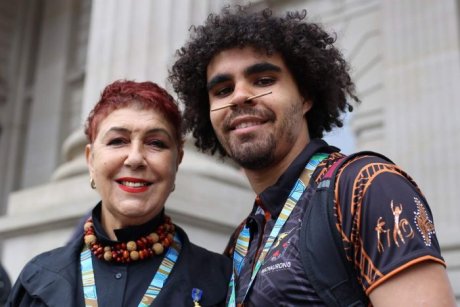
Carolyn Briggs and Jordan Edwards stand side-by-side smiling on the steps of Victorian Parliament.

Carolyn Briggs and Jordan Edwards are the eldest and youngest assembly members respectively.
On the steps outside the imposing pillars of Victoria’s Parliament House, Wathaurong, Gunditjmara and Arrernte man Jordan Edwards waited to enter the building and make history.
Key points:
Many assembly members spoke of the importance of bringing sceptical Aboriginal communities with them
Two members chose to leave their seats vacant due to concerns about the treaty process
Several members used their maiden speeches to call for treaties that respected Aboriginal nations’ sovereignty
He was among 30 members of the state’s First Peoples’ Assembly who formally met for the first time today to begin to pave the way for treaty negotiations between the Victorian Government and Aboriginal nations.
As the 21-year-old delivered his maiden speech in the state’s Upper House chamber, he acknowledged the Aboriginal community’s mixed emotions about the assembly’s meeting place.
“All my people since colonisation have screamed for treaty and now the chance is finally here,” he said.
“[But] I feel the lack of blackness in this process … A meeting of this magnitude should have been out in the scrub, in the bush, on country.”
He voiced his concerns about the journey ahead but also his aspirations as an elected member for Victoria’s south-west region.
“I understand how we are taking this place back … I also see the hope in this process to finally make a change for our people, but only if we eliminate everybody’s egos and self agendas,” he said.
Small possum-skin cloaks emblazoned with an Aboriginal artwork line the red seats of Victorian Parliament’s Upper House chamber.
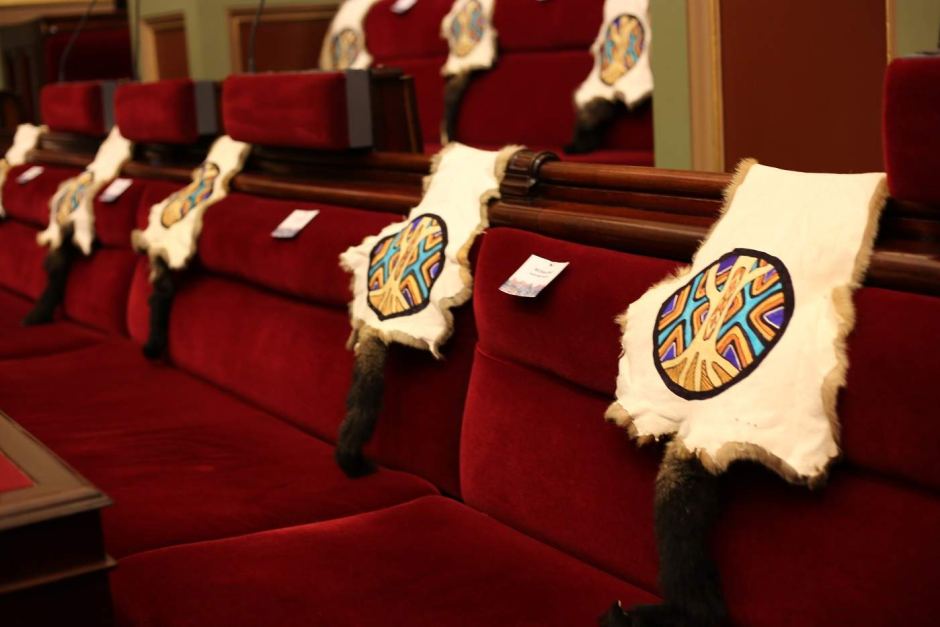
Possum cloaks were draped over each assembly member’s seat.
“We are not government, we do not have to act like them, we do not have to be like them.
“We need to start to put our lore and our culture as equal, ahead of the colonisers,” he finished, to cheers from the chamber.
Interim chair of the assembly, Wergaia elder Eleanor Bourke, urged the new members to build on the work of the Victorian Treaty Advancement Commission and engage more Aboriginal people in the process.
“People concentrate on the negative and I want to put to you that you have a responsibility to hold that Aboriginal electoral roll dear and to build on it,” she said.
A possum-skin quilt built from squares etched with messages about the promise of the treaty process.
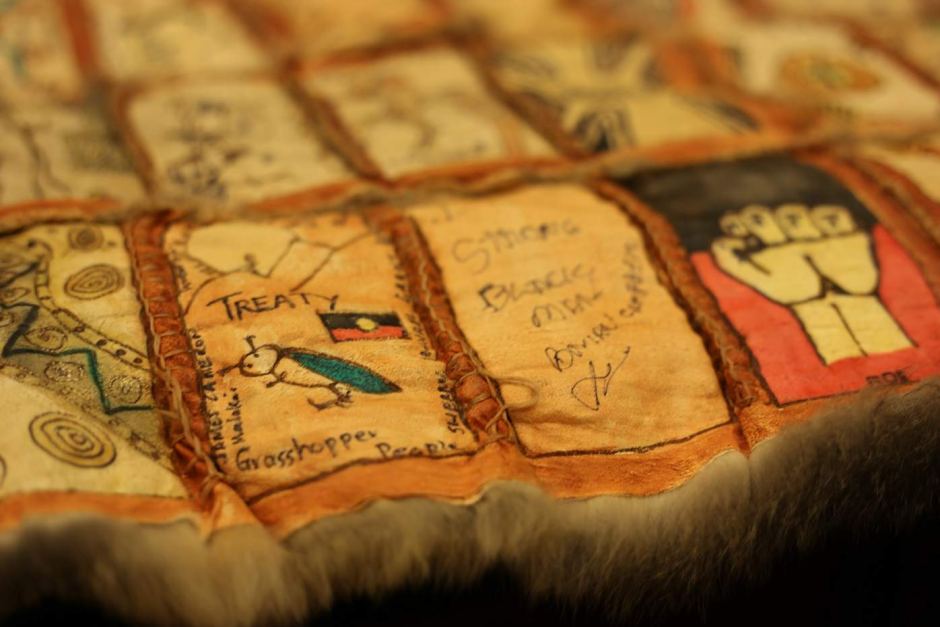
Several maiden speeches focused on the duty of assembly members to be a voice for their communities.
She also urged the members to focus on working together to build consensus.
“It doesn’t matter about the disagreements, you must treat each other with kindness, you must,” she said.
“You must not make this space uncomfortable. I think it is so important that we not be afraid and not even be negative about this, because we are now on a different footing.”
South-west region assembly member Sissy Austin said she felt the weight of history on her shoulders as she prepared to enter the building.
Sissy Austin and her father Neville Austin stand side-by-side smiling on the steps of Victoria’s Parliament House.
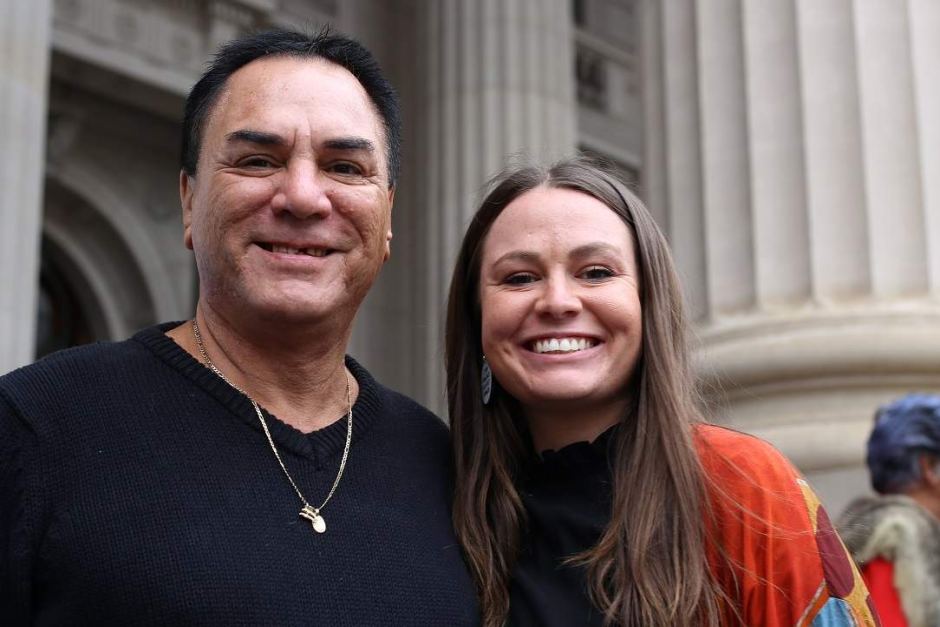
Sissy Austin’s father, Neville Austin, came to watch his daughter take her seat at the assembly’s historic first meeting.
“There’s years and years and years of our mob fighting in the streets and protesting on these streets and it feels so different that we can actually walk into that building and not be protesting here on these streets,” she said.
The Gunditjmara woman said she would be guided by her community, but she viewed reparations for the Stolen Generations as a key part of treaties, as well as a halt on the sale of Crown land in order to boost the land available for traditional owners’ future claims over country.
Yorta Yorta and Dja Dja Wurrung woman Muriel Bamblett, who heads the Victorian Aboriginal Child Care Agency, said she was “tired” of Aboriginal women being over-represented in family violence statistics.
“This is not about a land grab, this is not us being selfish, this is about our rights, our inherent rights as First Peoples of this country,” she said.
Nakia Cadd and Muriel Bamblett smile as they hold a possum-skin cloak together on the steps of Parliament House.
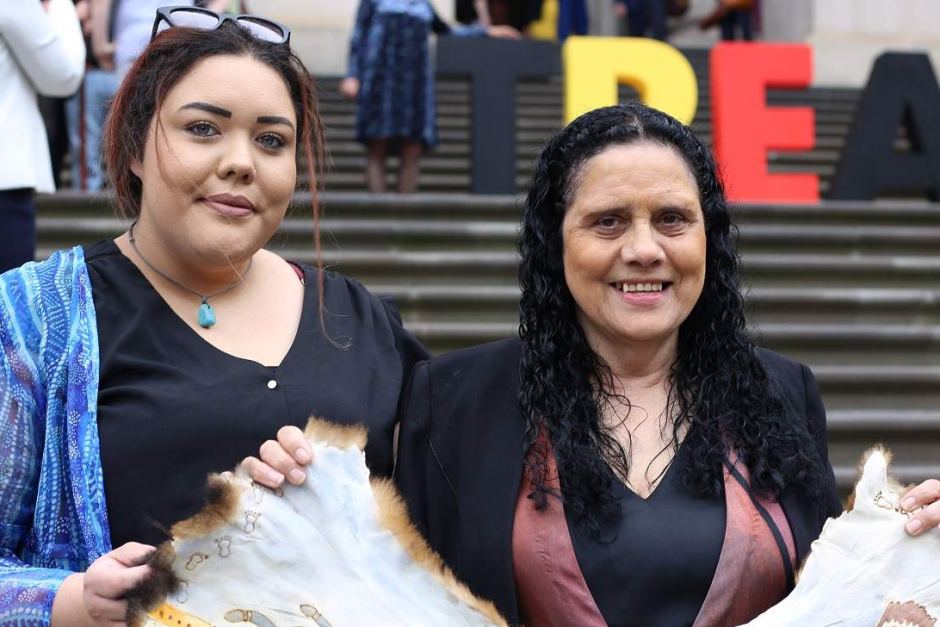
Muriel Bamblett (right) was joined by her granddaughter Nakia Cadd as she prepared to make her maiden speech.
Throughout the assembly, common threads could be found in the maiden speeches of the members, who spoke of their desire to overcome disagreements to create a legacy for future Aboriginal generations.
Two of the assembly’s 32 seats remained empty on its opening day, as the Yorta Yorta Nation Aboriginal Corporation stood by its decision earlier this year not to take up its designated seat at the assembly.
In June, the group voiced concern that participation in the “farcical” body could “provide a fast track toward the disempowerment of the sovereign Yorta Yorta nation and its people”.
North-west region member Jason Kelly also chose not to attend today’s maiden speeches due to concerns about the colonial setting being “culturally unsafe”, a point acknowledged by fellow member Ms Austin in her maiden speech.
Queensland and the Northern Territory are currently beginning their own moves towards state-based treaties.
At the close of the meeting, the assembly elected Taungurung member Marcus Stewart and Bangerang member Geraldine Atkinson as co-chairs.
It will now begin its major task of setting up a negotiation framework and treaty umpire, with Victoria venturing down a path that no Australian federal or state government has attempted before.



